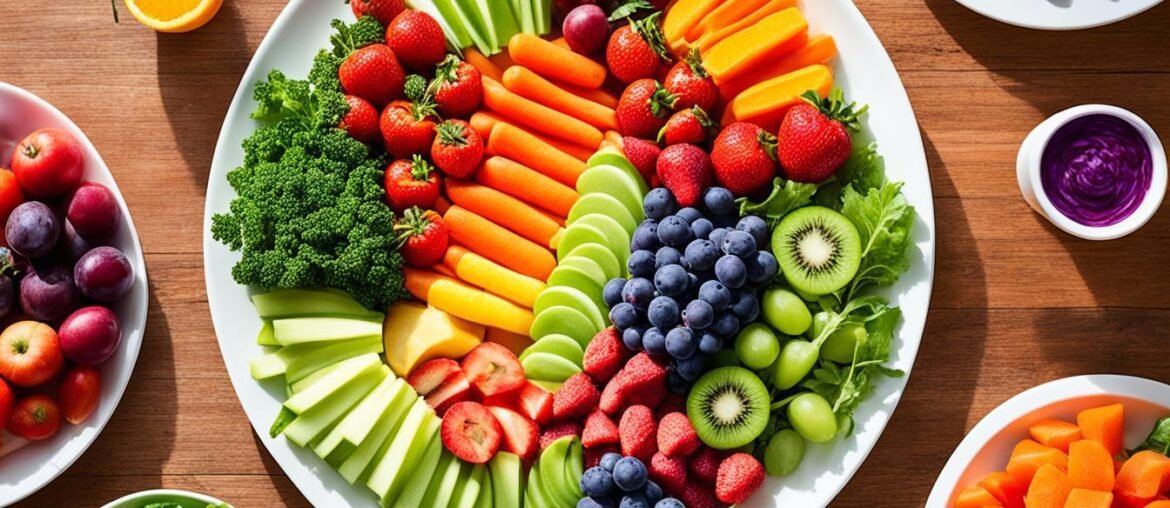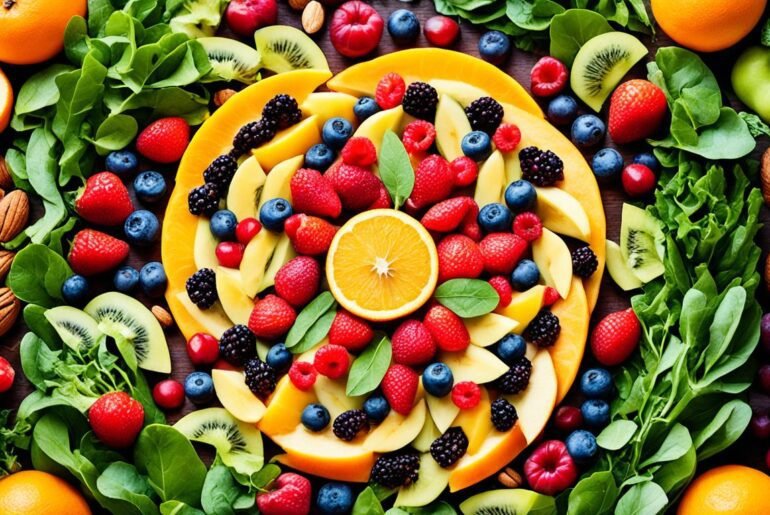Did you know that the foods you eat can have a direct impact on the health and appearance of your skin? It’s true! The right diet can help nourish your body and promote youthful, radiant skin. In this article, I will share with you 10 of the best foods for skin rejuvenation, so you can nourish your body and enjoy healthy, glowing skin as you age.
Key Takeaways:
- By incorporating skin-rejuvenating foods into your diet, you can nourish your body and support the health of your skin.
- Eating foods that are high in antioxidants, healthy fats, and essential nutrients can promote youthful and radiant skin.
- Broccoli, red bell pepper, spinach, sweet potatoes, watercress, avocado, blueberries, papaya, nuts, and pomegranate are all excellent choices for skin rejuvenation.
- These foods are rich in vitamins, minerals, and antioxidants that help protect against skin aging, promote collagen production, and provide overall skin nourishment.
- Including these skin-nourishing foods in your diet can contribute to healthy and radiant skin, naturally.
Broccoli – A Cruciferous Powerhouse for Skin Health
Broccoli is a versatile cruciferous vegetable that is not only delicious but also beneficial for your skin health. Packed with an array of essential nutrients, broccoli is known for its anti-inflammatory properties and is a great addition to your diet for promoting healthy and radiant skin.
One of the key vitamins found in broccoli is vitamin C, which plays a vital role in collagen production. Collagen is a protein that helps maintain the elasticity and firmness of your skin, keeping it youthful and supple. By incorporating broccoli into your meals, you can provide your body with the necessary vitamin C to support collagen synthesis.
Additionally, broccoli is rich in vitamin K, which is essential for blood clotting and bone health. Vitamin K also helps maintain skin health by reducing the appearance of dark circles and under-eye puffiness. Combined with its calcium content, broccoli contributes to overall bone health, which is essential for maintaining a strong and healthy skeletal structure.
Broccoli is an excellent source of various antioxidants, including vitamin C, that protect your skin cells from damage caused by free radicals. These antioxidants help combat oxidative stress and reduce the signs of aging, such as wrinkles and fine lines. They also assist in neutralizing harmful substances and toxins in the body, supporting overall skin health.
Besides vitamins C and K, broccoli is also packed with fiber, folate, and lutein. Fiber aids in digestion and promotes a healthy gut, which is essential for clear and glowing skin. Folate, on the other hand, supports the production of new cells, including skin cells, promoting a fresh and rejuvenated complexion. Lutein, a carotenoid present in broccoli, offers various health benefits, including improved memory and brain function.
Benefits of Broccoli for Skin Health:
- Anti-inflammatory properties that help reduce skin redness and irritation
- Rich in vitamins C and K, antioxidants, and fiber
- Promotes collagen production for youthful and firm skin
- Supports bone health with its calcium content
- Offers a variety of essential nutrients, including folate and lutein
Adding broccoli to your meals is a simple and effective way to nourish your skin from the inside out. Whether steamed, roasted, or incorporated into salads and stir-fries, this cruciferous powerhouse is a must-have for glowing and healthy skin.
Red Bell Pepper – An Antioxidant-Rich Skin Superfood
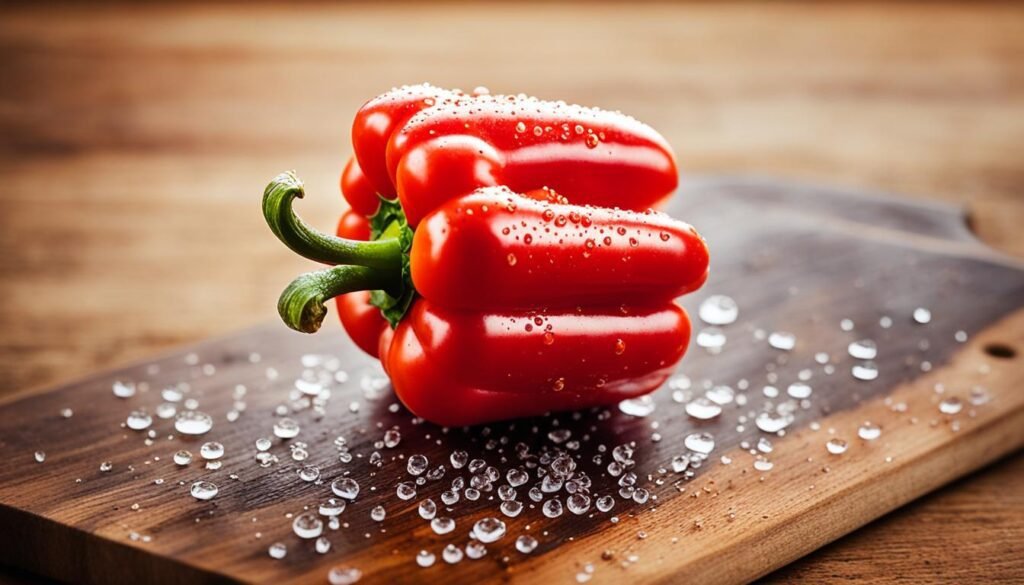
When it comes to nourishing your skin from within, red bell peppers are a powerhouse. These vibrant vegetables are not only delicious but also packed with antioxidants that promote skin health.
Red bell peppers are a rich source of vitamin C, a powerful antioxidant that plays a crucial role in skin rejuvenation. Vitamin C helps stimulate collagen production, which keeps the skin firm and elastic. It also helps reduce the appearance of fine lines and wrinkles, giving your skin a more youthful appearance.
In addition to vitamin C, red bell peppers are also loaded with carotenoids, another group of antioxidants that provide numerous benefits for your skin. Carotenoids help neutralize harmful free radicals, protecting your skin from damage caused by factors like pollution and UV rays.
Furthermore, the carotenoids in red bell peppers have anti-inflammatory properties, which means they can help reduce inflammation and redness in the skin. This can be especially beneficial for those with inflammatory skin conditions like acne or rosacea.
To fully reap the skin-boosting benefits of red bell peppers, try incorporating them into your daily diet. They can be enjoyed raw in salads, roasted as a side dish, or added to stir-fries and sandwiches for a flavorful and nutritious boost.
Benefits of Red Bell Peppers for Skin:
- High in antioxidants, including vitamin C and carotenoids
- Promotes collagen production for firm and elastic skin
- Protects against free radicals and environmental damage
- Has anti-inflammatory properties that reduce redness and inflammation
- Contributes to a more youthful and radiant complexion
So, the next time you’re planning your meals, don’t forget to include some red bell peppers. Your skin will thank you for it!
| Nutrient | Amount per 100g |
|---|---|
| Vitamin C | 127.7mg |
| Vitamin A | 3131 IU |
| Carotenoids | 5894µg |
| Potassium | 314mg |
| Dietary Fiber | 2.1g |
Spinach – A Hydrating Leafy Green for Skin Support
Spinach is a powerhouse leafy green that offers numerous benefits for the skin. Not only is it hydrating, but it is also packed with antioxidants and essential vitamins and minerals that promote skin health and overall well-being.
One of the key benefits of spinach is its high antioxidant content. Antioxidants help protect the skin from free radicals, which can damage cells and contribute to aging. Spinach is rich in vitamins A, C, E, and K, which are all potent antioxidants that neutralize harmful free radicals. These vitamins play a crucial role in maintaining healthy skin and reducing the signs of aging.
Furthermore, spinach is an excellent source of iron and magnesium. Iron is essential for healthy blood circulation, which ensures that oxygen and nutrients reach the skin cells, promoting a healthy complexion. Magnesium, on the other hand, helps to reduce inflammation and supports the skin’s natural healing processes.
Another beneficial component of spinach is lutein, a carotenoid that gives spinach its vibrant green color. Lutein has been found to promote skin health by protecting against sun damage and improving skin elasticity. It also has cognitive benefits and enhances memory function.
To summarize, incorporating spinach into your diet can provide a range of benefits for your skin. Its hydrating properties, antioxidant content, and abundance of vitamins and minerals work together to support skin health, promote collagen production, and combat signs of aging.
| Nutrient | Amount per 100g |
|---|---|
| Vitamin A | 469µg |
| Vitamin C | 28.1mg |
| Vitamin E | 2.03mg |
| Vitamin K | 482.9µg |
| Iron | 2.71mg |
| Magnesium | 79mg |
| Lutein | 12,198µg |
Sweet Potatoes – Rich in Skin-Boosting Nutrients
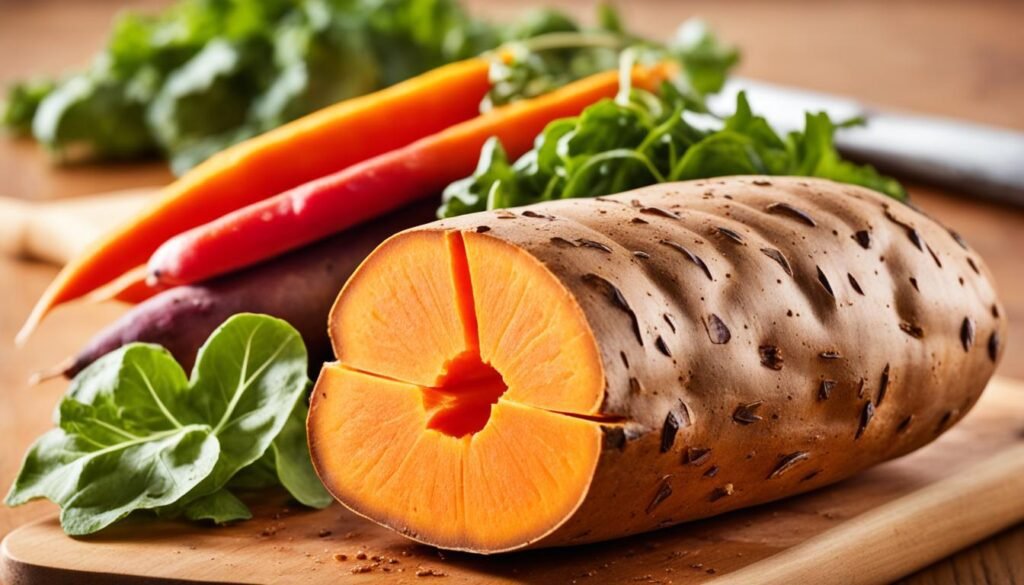
Sweet potatoes are not only delicious, but they are also packed with skin-boosting nutrients that can help you achieve a healthy and radiant complexion. These vibrant orange tubers are a rich source of beta-carotene, a pigment that gives them their bright color. Beta-carotene is converted to vitamin A in the body, which plays a crucial role in skin health.
Vitamin A derived from beta-carotene helps to restore skin elasticity and promote skin cell turnover, which can contribute to a smoother and more youthful appearance. Additionally, sweet potatoes are loaded with vitamins C and E, both of which have antioxidant properties that protect the skin from free radical damage.
The antioxidants found in sweet potatoes help neutralize harmful free radicals that can lead to premature skin aging and damage. Vitamin C, in particular, is known for its ability to stimulate collagen production, which can enhance the skin’s firmness and elasticity. Vitamin E, on the other hand, helps moisturize the skin and improve its overall texture.
Including sweet potatoes in your diet is an excellent way to nourish your skin from within. Whether baked, roasted, or mashed, there are numerous ways to enjoy the delicious flavor and reap the skin-boosting benefits of sweet potatoes.
Here’s a quick breakdown of the skin-boosting nutrients found in sweet potatoes:
| Nutrient | Function |
|---|---|
| Beta-carotene | Converted to vitamin A, restores skin elasticity, promotes skin cell turnover |
| Vitamin C | Stimulates collagen production, protects against free radicals |
| Vitamin E | Moisturizes the skin, improves texture, protects against free radicals |
Source: Reference to the first source
Watercress – A Nutrient-Dense Green for Skin Health
When it comes to nourishing your skin, watercress is a powerful ingredient that should not be overlooked. This nutrient-dense leafy green is packed with essential vitamins and minerals that can promote healthy and radiant skin.
Watercress is an excellent source of vitamins A, C, K, B1, and B2. These vitamins play a vital role in maintaining the health and appearance of your skin. Vitamin A helps to promote skin cell turnover, while vitamin C aids in collagen production, resulting in firmer and more youthful-looking skin. Vitamin K is known for its ability to reduce the appearance of dark circles and bruises, giving your skin a brighter and more even tone.
In addition to vitamins, watercress also provides essential minerals such as calcium, potassium, manganese, and phosphorus. These minerals are crucial for maintaining the skin’s elasticity, hydration, and overall health. Calcium helps to regulate sebum production, preventing the skin from becoming too oily or too dry. Potassium helps to hydrate and moisturize the skin, giving it a soft and supple texture. Manganese and phosphorus contribute to collagen synthesis, ensuring that your skin remains firm and plump.
But the benefits of watercress don’t stop there. This nutrient-dense green also contains antioxidants that protect the skin from free radicals and oxidative stress. These antioxidants help to reduce inflammation, protect against UV damage, and promote overall skin health. Additionally, watercress supports the immune system, aids digestion, and provides a wide range of health benefits.
“Watercress is a true superfood for your skin. Its nutrient profile is unparalleled, making it an excellent addition to your diet for achieving healthy and glowing skin.”
Incorporating watercress into your diet is easy. You can enjoy it in salads, sandwiches, smoothies, or as a garnish for various dishes. Its peppery flavor adds a delightful kick to any meal, making it a versatile and delicious ingredient.
So why wait? Start reaping the skin-nourishing benefits of watercress today and enjoy the radiance and vitality that it brings.
| Vitamins | Minerals |
|---|---|
| Vitamin A | Calcium |
| Vitamin C | Potassium |
| Vitamin K | Manganese |
| Vitamin B1 | Phosphorus |
| Vitamin B2 |
Avocado – A Skin-Nourishing Fruit
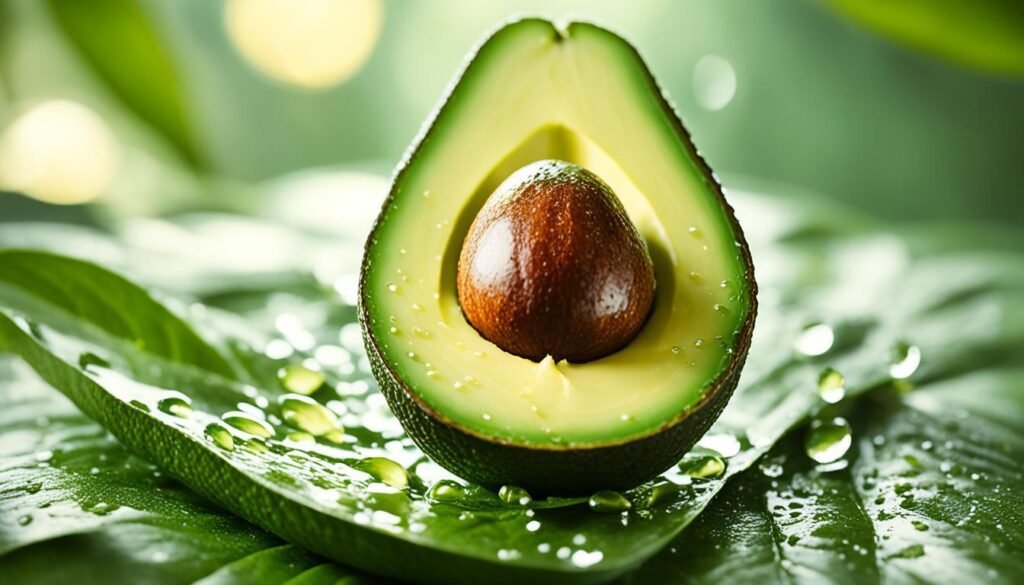
When it comes to nourishing your skin from within, avocados are an excellent choice. Packed with healthy fats, avocados provide your skin with the nourishment it needs to stay healthy and vibrant.
Rich in vitamins K, C, E, and A, avocados offer a wide range of benefits for your skin. Vitamin K helps improve the skin’s elasticity and promotes a youthful appearance. Vitamin C is known for its antioxidant properties, protecting the skin from free radicals and promoting collagen production. Vitamin E helps nourish and moisturize the skin, keeping it soft and supple. And vitamin A supports the growth and repair of skin cells, helping to maintain a healthy complexion.
In addition to vitamins, avocados are also a good source of B vitamins, which play a vital role in skin health. B vitamins help prevent dryness and flakiness, keeping your skin moisturized and smooth. Avocados also contain potassium, which helps maintain proper hydration and electrolyte balance in the skin.
Adding avocados to your diet on a regular basis can provide your skin with the essential nutrients it needs to thrive. Whether sliced on toast, added to salads, or blended into a creamy smoothie, avocados are a versatile and delicious way to support your skin health.
So why wait? Start incorporating avocados into your meals and enjoy the nourishing benefits they offer for your skin. Your body will thank you!
Blueberries – An Antioxidant-Rich Fruit for Skin Protection
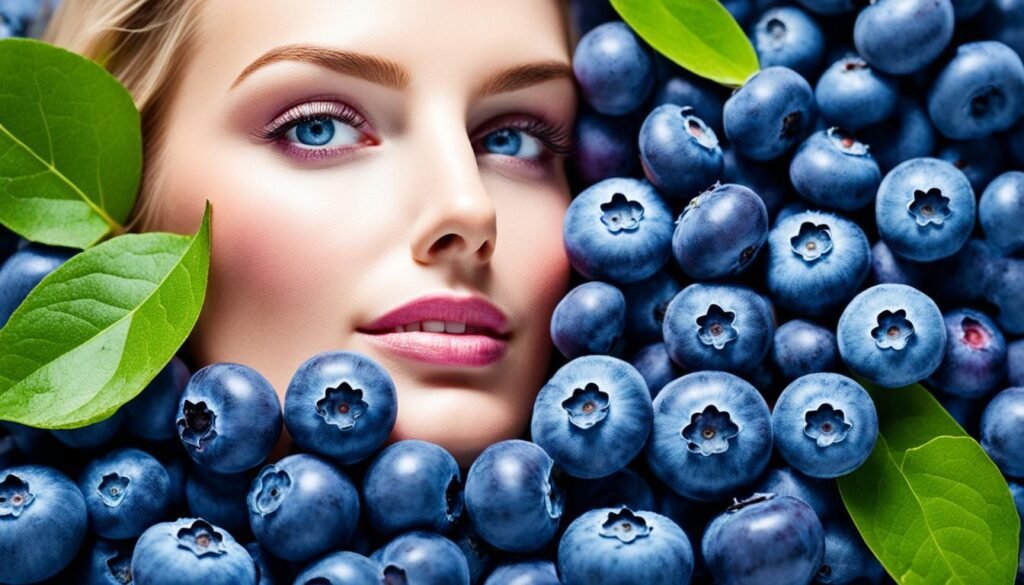
When it comes to nourishing your skin from within, blueberries are a powerhouse fruit that you shouldn’t overlook. Not only are they delicious, but they are also packed with essential nutrients that promote skin health and protection.
Blueberries are rich in antioxidants, particularly vitamins A and C, which play a vital role in protecting your skin from sun damage and reducing inflammation. These antioxidants act as a shield against harmful free radicals, preventing them from causing oxidative stress to your skin cells.
The anti-inflammatory properties of blueberries can help calm irritated skin and reduce redness, making them an excellent choice for individuals with sensitive or acne-prone skin. By reducing inflammation, blueberries contribute to a clearer and more balanced complexion.
In addition to their antioxidant and anti-inflammatory properties, blueberries may also help protect collagen, a protein that gives your skin its elasticity and firmness. Collagen plays a crucial role in maintaining the youthful appearance of your skin, and preserving it is essential for preventing the formation of wrinkles and sagging.
To reap the benefits of blueberries, incorporate them into your diet regularly. Whether you enjoy them on their own as a tasty snack, sprinkle them on top of yogurt or cereal, or add them to smoothies, blueberries are a versatile fruit that can be enjoyed in various ways.
Did You Know? Blueberries are often referred to as “brain berries” due to their high content of antioxidants and their potential to improve brain function and protect against age-related cognitive decline.
To make the most of blueberries’ skin-protecting benefits, aim to consume them as part of a balanced diet that includes other skin-nourishing foods mentioned in this article. By providing your body with a diverse range of nutrients, you can support overall skin health and achieve that coveted healthy and radiant glow.
Blueberry Nutritional Profile:
| Nutrient | Amount per 1 cup (148g) |
|---|---|
| Calories | 84 |
| Fiber | 3.6g |
| Vitamin C | 14.4mg |
| Vitamin K | 28.6mcg |
| Vitamin E | 0.8mg |
| Vitamin A | 80 IU |
| Potassium | 114mg |
| Antioxidants | Various types |
Blueberries are a nutritious addition to your diet, providing not only skin-boosting benefits but also a range of vitamins and minerals that support overall health. So why not incorporate these antioxidant-rich fruits into your daily routine and give your skin the protection it deserves?
Papaya – A Superfood for Skin Rejuvenation
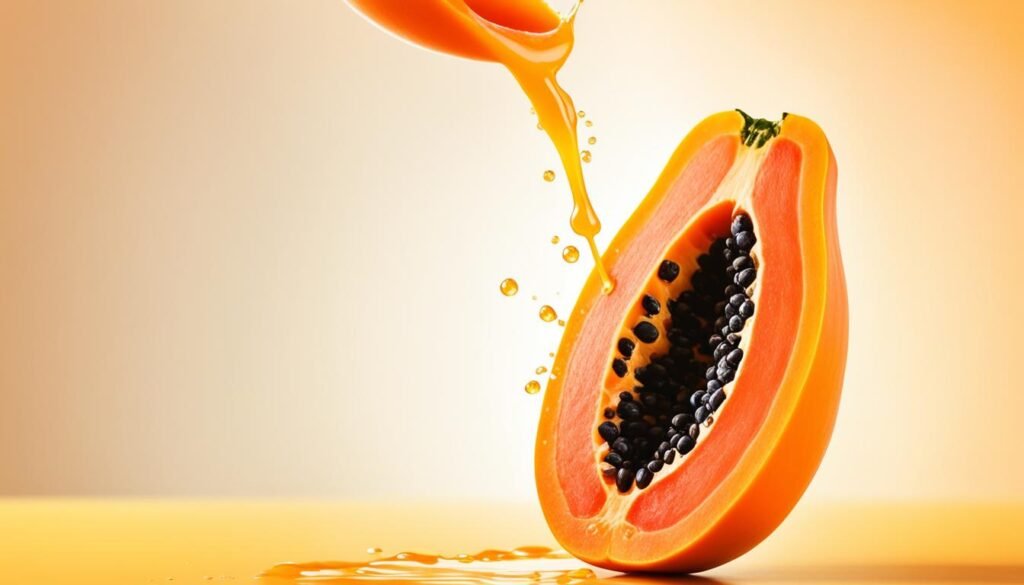
When it comes to skin rejuvenation, papaya is a superfood that delivers exceptional benefits. Packed with a wide range of antioxidants, vitamins A, C, K, and E, as well as minerals like calcium, potassium, magnesium, and phosphorus, papaya provides the essential nutrients your skin needs to stay healthy and radiant.
The antioxidants found in papaya help combat free radicals, reducing age-related effects on the body and promoting youthful skin. Vitamin C, in particular, aids in collagen production, which supports skin elasticity and reduces the appearance of wrinkles. Additionally, the presence of vitamins A, K, and E contributes to overall skin health and vitality.
Furthermore, papaya is rich in B vitamins, which play a crucial role in maintaining healthy skin. These vitamins help regulate oil production, promote cell turnover, and improve skin texture, giving you a smooth and rejuvenated complexion.
Another key component of papaya is papain, an enzyme with exfoliating properties that gently removes dead skin cells, revealing fresher and brighter skin underneath. Regularly incorporating papaya into your skincare routine can help improve skin texture, tone, and overall appearance.
Papaya’s nutritional content is not limited to its benefits for skin rejuvenation. It also supports your immune system and aids in digestion, making it a valuable addition to your overall wellness.
Papaya is a powerhouse of essential nutrients that promote skin rejuvenation, support the immune system, and help prevent age-related diseases. Its antioxidant-rich composition, along with vitamins A, C, K, and E, ensures that your skin receives optimal nourishment for a youthful and radiant appearance.
Papaya Nutritional Content
| Nutrient | Amount per 100g |
|---|---|
| Antioxidants | High concentration |
| Vitamin A | 950 IU |
| Vitamin C | 62 mg |
| Vitamin K | 2.6 µg |
| Vitamin E | 0.3 mg |
| Calcium | 20 mg |
| Potassium | 257 mg |
| Magnesium | 21 mg |
| Phosphorus | 10 mg |
| B Vitamins | Various |
| Papain | Enzyme content |
As shown in the table above, papaya is loaded with essential nutrients that contribute to skin rejuvenation and overall health. Its remarkable combination of antioxidants, vitamins, minerals, and enzymes makes it a powerful ally in your quest for youthful and glowing skin.
Nuts – Nutrient-Packed Snacks for Skin Health
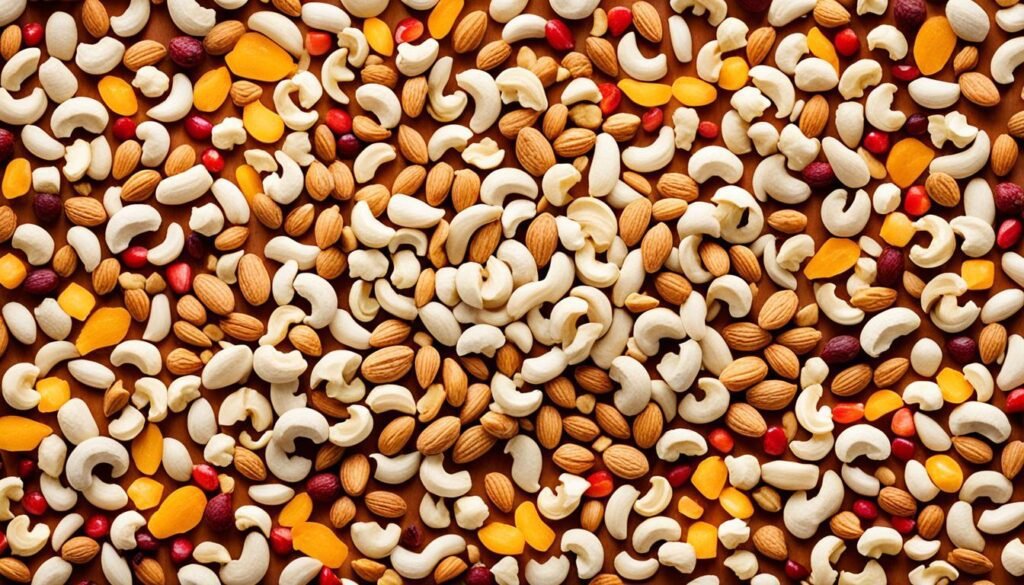
When it comes to promoting skin health, nuts play a crucial role. They are not only delicious but also loaded with essential nutrients that support your skin’s well-being. Incorporating various nuts into your diet can provide a wide range of skin-nourishing benefits.
Let’s take a closer look at two nuts that are particularly beneficial for your skin:
Almonds – Repair and Protect
Almonds are a fantastic source of vitamin E, a powerful antioxidant that helps repair damaged skin tissue and protects it from harmful UV rays. This vitamin plays a vital role in maintaining skin health and can improve its overall appearance.
Vitamin E aids in preventing skin dehydration and enables the skin to retain its moisture levels, resulting in a more hydrated and supple complexion. Additionally, it helps to reduce the appearance of scars and promotes a smoother skin texture.
Walnuts – Omega-3 Fatty Acids for Skin Cell Membranes
If you’re looking to enhance your skin cell membranes, walnuts are the perfect addition to your diet. In addition to being a good source of vitamin E, walnuts contain omega-3 fatty acids.
Omega-3 fatty acids are renowned for their anti-inflammatory properties, which can help to reduce skin redness and acne flare-ups. They also contribute to maintaining the structural integrity of your skin cell membranes, promoting overall skin health.
A Nutty Mix for Radiant Skin
While almonds and walnuts offer unique benefits, it’s important to remember that different nuts provide various nutrients and antioxidants that support skin health. By incorporating a mix of nuts into your diet, you can enjoy their collective advantages.
Here is a comparison table of the nutritional benefits of popular nuts:
| Nuts | Vitamin E (mg per 100g) | Omega-3 Fatty Acids (g per 100g) | Antioxidants |
|---|---|---|---|
| Almonds | 25.6 | 0 | Yes |
| Walnuts | 0.7 | 2.7 | Yes |
| Cashews | 0.9 | 0.1 | No |
| Pistachios | 2.4 | 0.6 | Yes |
As you can see, each nut has its own unique nutritional profile. By enjoying a variety of nuts, you can supply your skin with a diverse array of antioxidants, vitamin E, and omega-3 fatty acids.
“Incorporating a mix of nuts into your diet can provide antioxidant benefits and contribute to healthy and youthful skin.”
So, next time you’re looking for a nutrient-packed snack, reach for a handful of nuts. They not only satisfy your cravings but also nourish your skin from within, helping you achieve healthy and glowing skin.
Pomegranate – A Powerful Fruit for Skin Protection

When it comes to protecting your skin, pomegranate is a fruit that deserves attention. Packed with antioxidants, pomegranate offers numerous benefits for skin health and preservation.
One of the key compounds found in pomegranate is ellagic acid, which has been shown to naturally help prevent wrinkles and protect the skin from inflammation caused by sun exposure. Antioxidants, such as those found in pomegranate, play a crucial role in neutralizing free radicals and reducing oxidative stress on the skin.
Furthermore, pomegranate is great for collagen preservation. Collagen is a protein that provides structure and elasticity to the skin. As we age, collagen levels naturally decline, leading to the formation of wrinkles and sagging skin. The antioxidants in pomegranate help preserve collagen, contributing to improved skin elasticity and a more youthful appearance.
To reap the benefits of pomegranate for skin protection, consider incorporating pomegranate or its extracts into your diet. You can enjoy the fruit itself, consume pomegranate juice, or even use skincare products infused with pomegranate.
How to Incorporate Pomegranate into Your Diet
Pomegranate can add a burst of flavor and nutritional value to various dishes. Here are a few ideas to help you incorporate this powerful fruit into your diet:
- Add pomegranate arils to your morning yogurt or smoothie bowl for a refreshing and nutritious boost.
- Create a flavorful salad by tossing pomegranate arils with leafy greens, feta cheese, and a drizzle of balsamic vinaigrette.
- Make a delicious and colorful salsa by combining pomegranate arils, diced avocado, red onion, jalapeno, lime juice, and cilantro.
- Prepare a pomegranate glaze by simmering pomegranate juice with honey, lemon juice, and a pinch of salt. Use it as a marinade for grilled proteins or a topping for roasted vegetables.
By incorporating pomegranate into your diet, you can support your skin health, protect against wrinkles, and promote collagen preservation.
Conclusion
Nourishing your skin from the inside with nutrient-dense foods is crucial for achieving healthy and radiant skin. The foods discussed in this article, such as broccoli, red bell pepper, spinach, sweet potatoes, watercress, avocado, blueberries, papaya, nuts, and pomegranate, provide a wide range of essential nutrients and powerful antioxidants that support skin rejuvenation.
By incorporating these skin-nourishing foods into your diet, you can nourish your body and promote youthful and glowing skin. These foods are rich in vitamins, minerals, and antioxidants that help protect your skin from damage, reduce inflammation, and support collagen production.
Remember, healthy skin goes beyond skincare products; it starts with the foods we eat. So, make sure to include these natural sources of nourishment for youthful skin in your daily diet and enjoy the benefits of healthy and radiant skin.
FAQ
Can eating certain foods help rejuvenate the skin?
Yes, eating foods that are high in antioxidants, healthy fats, and essential nutrients can help support your skin’s health and rejuvenation.
What are the benefits of eating broccoli for skin health?
Broccoli is an anti-inflammatory and aging-support powerhouse. It is packed with vitamins C and K, antioxidants, fiber, folate, lutein, and calcium, all of which contribute to skin health and overall well-being.
How does red bell pepper benefit the skin?
Red bell peppers are loaded with antioxidants, including vitamin C and carotenoids, which have anti-inflammatory properties. These antioxidants help protect against sun damage and reduce the signs of skin aging.
What makes spinach a good food choice for skin support?
Spinach is super hydrating and packed with antioxidants. It is rich in vitamins A, C, E, and K, as well as minerals like iron and magnesium. These nutrients support collagen production, hair health, and overall skin health.
How do sweet potatoes contribute to skin health?
Sweet potatoes contain beta-carotene, which is converted to vitamin A in the body. Vitamin A helps restore skin elasticity and promote skin cell turnover. Sweet potatoes also provide vitamins C and E, which protect the skin and have antioxidant properties.
What are the benefits of watercress for the skin?
Watercress is a nutrient-dense leafy green that is rich in vitamins A, C, K, B1, and B2, as well as minerals like calcium, potassium, manganese, and phosphorus. The antioxidants in watercress promote skin health and provide a wide range of overall health benefits.
How does avocado nourish the skin?
Avocados are high in healthy fats, vitamins K, C, E, and A, B vitamins, and potassium. These nutrients provide essential nourishment for the skin and support overall health. Avocado consumption has been linked to enhanced skin health.
What skin benefits do blueberries offer?
Blueberries are rich in antioxidants, including vitamins A and C, which protect the skin from sun damage and reduce inflammation. They also help protect collagen and promote skin health.
How does papaya contribute to skin rejuvenation?
Papaya is a superfood that is rich in antioxidants, vitamins, minerals, and papain. Its antioxidants help reduce age-related effects on the body, improve digestion, and promote skin rejuvenation.
How do nuts contribute to skin health?
Many nuts, such as almonds and walnuts, are packed with nutrients that support skin health. Almonds are a good source of vitamin E, which repairs skin tissue, while walnuts contain omega-3 fatty acids that are beneficial for skin cell membranes.
What are the skin benefits of consuming pomegranate?
Pomegranate is rich in antioxidants, including ellagic acid, which can naturally help prevent wrinkles and protect skin from sun-induced inflammation. Its antioxidants also help preserve collagen, promoting skin elasticity.
How can incorporating these foods into my diet benefit my skin?
These foods, including broccoli, red bell pepper, spinach, sweet potatoes, watercress, avocado, blueberries, papaya, nuts, and pomegranate, offer a wide range of essential nutrients and antioxidants that support skin rejuvenation. Incorporating them into your diet can help nourish your body and promote youthful and glowing skin.

